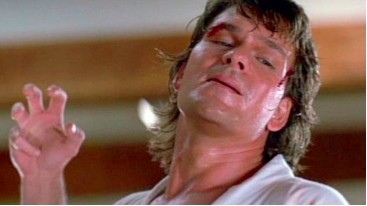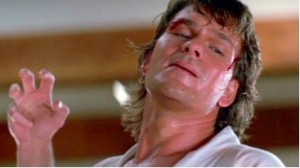

Road House stars Patrick Swayze as James Dalton, a professional “cooler” – an elite-level bouncer – hired to bring structure and sanity to a road-side bar in Missouri that is replete with short-tempered heavy drinkers prone to violent outbursts. This, I suppose, makes sense. The resulting conflict between Dalton and Brad Wesley, the corrupt businessman who provides the bar with its alcohol, does not. Through two hours of explosions, acts of extreme violence, and murder, I was never really able to understand why everyone was so mad. But they were mad, and it made the movie – though completely illogical – hilarious.
At random intervals throughout the movie, we learn moderately interesting (read: not interesting at all) facts about Dalton that serve as some sort of character building exercise, a way for the viewer to understand this mysterious, quiet, elite-level bouncer who always takes his coffee as black as the day is long. For example, we find out that Dalton has a doctorate degree from NYU in Philosophy, which I suppose answers the question asked by many exacerbated parents: “What the hell are you going to do with a degree in Philosophy?” We also find out that Dalton avidly practices Tai Chi (this is an obvious ploy to get Swayze shirtless) and has a fascination with cars (there is no explanation for this at all, other than that I suppose all men with any muscle at all like cars). There is also a subtle hint that Dalton may have pulled someone’s trachea out during a past job – yes, a trachea.
The Tai Chi-loving shirtless wonder does a good job – almost too good of a job – of cleaning up the bar he was hired to clean up. He rules with a velvet glove, preferring to use stern words and a calm demeanour instead of his fists. After all, according to what Dalton says to his love interest “Doc” (not surprisingly, she’s a doctor), “nobody wins a fight.”
Wesley lacks any of the redeemable, Zen-like qualities possessed by Dalton. He is a businessman, focused on bringing big-box stores like J.C. Penney to Jasper, the small Missouri town. The fact that he regularly drives a monster truck around town is a clear indication that he runs Jasper, though it is difficult to take him seriously as some sort of millionaire mogul given how much time he spends focused on what is going on at shitty businesses in a small town. Dalton’s intervention in his business does not please him, particularly after Dalton – in the name of cleaning up the bar – fires some people closely connected to him. When Dalton refuses to join forces and work for Wesley (Dalton works for justice, idiot), all hell breaks loose.
Much of the hell breaks loose at the hands of Wesley’s henchmen. The leader of the henchmen appears to be Jimmy, a man clearly made up to look like an evil version of Patrick Swayze, with flowing black hair (he is the Scar to Swayze’s Mufasa). Bad Swayze is responsible for the best line in the movie, when he tells Dalton that he “used to fuck guys like you in prison.” Wesley, Bad Swayze and the rest of the henchmen carry out a series of attacks on those closest to Dalton and those who refuse to submit to Wesley’s authority. The attacks become progressively more extreme as the movie moves along. A local business owner’s auto parts store is exploded; then, one of Wesley’s henchmen drives through a car dealership with Wesley’s monster struck, leaving a path of destruction in its wake.
Following another explosion at the house Dalton was staying at, Dalton sees Bad Swayze fleeing the scene by way of motorcycle. Such motorized transportation is no barrier to Dalton, as he somehow manages to chase Bad Swayze down on foot. The two fight – oh, do they fight – and, as rumoured, Dalton’s finishing move on Bad Swayze is a hand to the throat. That’s right, Dalton tears Bad Swayze’s trachea out. “Doc” quickly arrives, checks on Bad Swayze, and pushes Dalton away. It is clear that his violence disturbs her, which isn’t surprising; he pulls people’s tracheas out, for God’s sake.
The final act of violence is the cruelest of all. After an alarming phone conversation with Dalton about the goings-on in Jasper, Dalton’s mentor arrives at the scene. Played by Sam Elliott (that guy with the famous voice who always tries to sell you Dodge Rams), Wade Garrett has long been considered the elite of the elite in terms of coolers (yes, in the movie Road House there is a hierarchy of coolers and, for whatever reason, these glorified bouncers are well-known by seemingly everyone); he looks ragged, though. He has grey hair and his career is almost certainly on the downswing. Tragically, Wade is killed, presumably by Wesley’s henchmen; leaned over a bar, Dalton thinks that this is just classic Wade, having had a little too much to drink. Upon closer inspection, though, Wade had a knife lodged through his chest and was dead.
This sends Dalton into a rage, speeding towards Wesley’s mansion. After disposing of Wesley’s henchmen, he comes face to face with Wesley. Dalton has him in the ideal position for his patented Trachea Tear-out; his hand shakes furiously, as if he can’t control it. He does, though, and backs off. This is a mistake, as Wesley grabs a gun. Prepared to kill Dalton, Wesley is shot and killed by Dalton’s friends.
So turned on by Dalton’s new ability to control his trachea-tearing hand, “Doc” ends up with Dalton, Dalton stays in Jasper, and all is good.
In the late Roger Ebert’s review of this film, he said the following: “‘Road House’ exists right on the edge between the ‘good-bad movie’ and the merely bad. I hesitate to recommend it, because so much depends on the ironic vision of the viewer. This is not a good movie. But viewed in the right frame of mind, it is not a boring one, either.”
Roger is right. This movie makes no sense, but it is this nonsense that makes it worth watching. It’s this nonsense that compels me to review a 1989 film and to urge you to sign into Netflix and watch it this second. If you’ve watched it already, watch it again. I know I have.
